Last Update: November 14, 2015
Collectively we have over 100 years of communal experience with gasoline powered vehicles. It means our inner range meter is calibrated to gasoline and the knowledge that another gas station is always around the corner. Electricity is measured in a whole different way, and driving an electric vehicle means learning a few new units of measurement.
Where gasoline is measured in gallons, electricity is measured in coulombs. But, for the average electricity user it is the kiloWatt-Hour that's shown on electricity bills, on charging stations, by the car makers and everyone else, so we'll be talking kiloWatt-hours (kWH's).
Let's start with defining "energy" - "power derived from the utilization of physical or chemical resources, especially to provide light and heat or to work machines."
In other words, hopping in our car to drive to work, or over the fields and through the woods to grandma's house, requires "energy" to move us down the road. There's nothing magical about gasoline or diesel, they're simply fuels which contain energy for which engineers have spent 100+ years developing internal combustion engines to release and harness the energy in hydrocarbons.
It's quite possible to build vehicles running on other kinds of energy storage systems to achieve the same result. For example, several teams are working to harness compressed air to run "engines" powered by the release of the compressed air. Compressing air stores energy which is released when the air tank nozzle is opened and the air is released. Compressed air engines direct that air flow through cylinders to drive a crank shaft that then drives wheels.
The main goal we have is to trade the dirty toxic life cycle of gasoline/diesel fuels with the clean green lifecycle of electric vehicles. That means understanding the different energy choices we have so we can choose between one or the other.
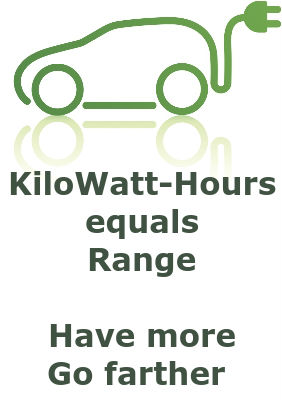 Electric cars carry kiloWatt-hours of energy, rather than gallons of gasoline. It takes about 33.4 kiloWatt-hours to equal 1 gallon of gasoline, meaning electric cars like the Nissan Leaf carry the energy equivalent of about 2/3rds of a gallon of gasoline with which it can travel 80 miles or so. This works because electric drive trains are highly efficient.
Electric cars carry kiloWatt-hours of energy, rather than gallons of gasoline. It takes about 33.4 kiloWatt-hours to equal 1 gallon of gasoline, meaning electric cars like the Nissan Leaf carry the energy equivalent of about 2/3rds of a gallon of gasoline with which it can travel 80 miles or so. This works because electric drive trains are highly efficient.
There is no magic in building a long range electric car. All that's required is, as Tesla Motors has done, an electric car with a large battery pack. The 265 mile range of the Tesla Model S requires an 85 kiloWatt-Hour battery pack. The trick that's kept us from mass market long range electric cars is the cost resulting from a large battery pack.
For more information see: Understanding kiloWatt-hours in electric cars and other gizmos
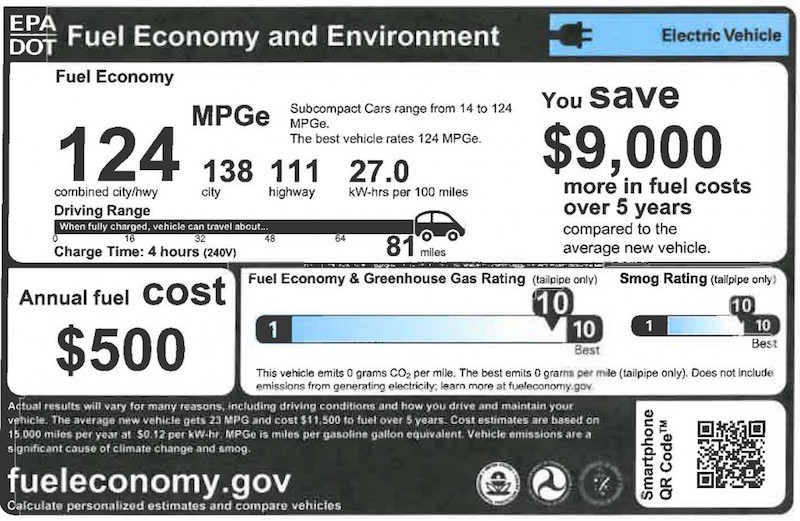 The EPA developed an electric car version of the Monroney label, that's full of useful information. Reading the label is easier with a little bit of basic knowledge, and can help you compare one electric car to another, and understand the potential to save money with electric cars.
The EPA developed an electric car version of the Monroney label, that's full of useful information. Reading the label is easier with a little bit of basic knowledge, and can help you compare one electric car to another, and understand the potential to save money with electric cars.
For more information see: Understanding the EPA ratings label for electric cars
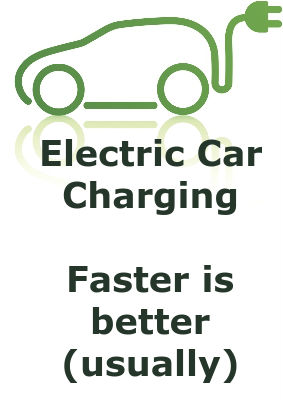 Usually we think electric car charging should be as fast as possible. One of the electric car acceptance hurdles is the charging time, and its impact on effective trip speed, especially as we're all accustomed to refueling 300+ miles of range in 5 minutes at gasoline stations. On the other hand there are lots of scenarios where 120 volt 12 amp "Level 1" charging is acceptible. Maybe the car will be in airport long-term parking for 3 days and it doesn't matter if it takes 2.5 days to charge the car. Or maybe a 7.5 hour charge session, giving 20+ miles of range, will fit quite well with an 8 hour workday for someone whose commute is 20 miles or less each way.
Usually we think electric car charging should be as fast as possible. One of the electric car acceptance hurdles is the charging time, and its impact on effective trip speed, especially as we're all accustomed to refueling 300+ miles of range in 5 minutes at gasoline stations. On the other hand there are lots of scenarios where 120 volt 12 amp "Level 1" charging is acceptible. Maybe the car will be in airport long-term parking for 3 days and it doesn't matter if it takes 2.5 days to charge the car. Or maybe a 7.5 hour charge session, giving 20+ miles of range, will fit quite well with an 8 hour workday for someone whose commute is 20 miles or less each way.
For more information see: Electric car charging speed and effective trip speed on road trips
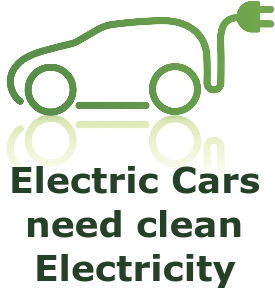 Some people deride or dismiss electric vehicles for being "coal powered" and they cannot be as clean as gasoline powered cars. But, repeated studies have shown that's not true.
Some people deride or dismiss electric vehicles for being "coal powered" and they cannot be as clean as gasoline powered cars. But, repeated studies have shown that's not true.
It is true that electricity generated at a coal power plant is "dirtier" than electricity coming from other sources. But even when the electric car is charged from coal generated electricity, it's still a bit cleaner than gasoline cars.
The bottom line is that renewable energy (solar, wind, etc) is immensely cleaner than any fossil fuel electricity, even when generated from natural gas. We badly need a wholesale switch to renewable electricity sources for this reason alone. The good news is that within a few years it will make economic sense to do so, without subsidies, at which time renewable energy should take off.
For more information see: The coal-powered EV myth; Electricity is only as clean as the method to generate it
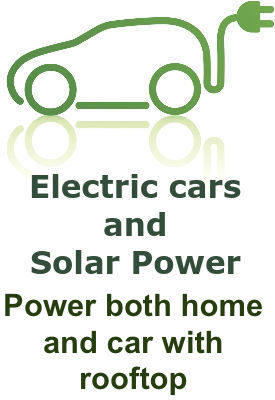 Electric cars and solar panels go hand-in-hand in some promotional pictures. While it's a cool marketing image, it's also the most compact use of land to generate enough energy to power cars. With corn-based ethanol about 2.75 acres of corn is required, per car, per year, plus additional land for fermentation and fuel distribution infrastructure. With solar power, it's feasible for a home solar array to power not only the house, but an electric car.
Electric cars and solar panels go hand-in-hand in some promotional pictures. While it's a cool marketing image, it's also the most compact use of land to generate enough energy to power cars. With corn-based ethanol about 2.75 acres of corn is required, per car, per year, plus additional land for fermentation and fuel distribution infrastructure. With solar power, it's feasible for a home solar array to power not only the house, but an electric car.
Gasoline car owners simply can't produce their own fuel at home. The closest would be ethanol, but that requires a lot of land and labor and machinery.
For more information see: Solar panels can power the home and electric car, from the roof top — can’t do that with gasoline cars
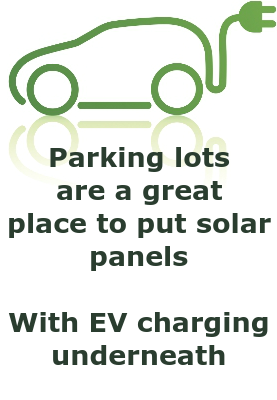 Positioning electric cars next to solar panels makes for a great picture. Visually connecting them with renewable energy systems, like wind and solar, is the perfect way to show how clean electric cars CAN be. In practice, it's not enough to just put solar panels over a parking lot. It is so much more real to have charging stations underneath the solar panels. But the electrons won't flow directly from solar panels to the cars, unless some extra equipment and grid energy services are put into use.
Positioning electric cars next to solar panels makes for a great picture. Visually connecting them with renewable energy systems, like wind and solar, is the perfect way to show how clean electric cars CAN be. In practice, it's not enough to just put solar panels over a parking lot. It is so much more real to have charging stations underneath the solar panels. But the electrons won't flow directly from solar panels to the cars, unless some extra equipment and grid energy services are put into use.
For more information see: Solar panel covered parking lots with charging stations underneath – EV Nirvana
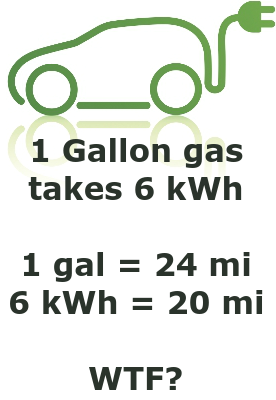 According to a popular factoid, it takes 6 kiloWatt-hours of electricity to refine a gallon of gasoline. An electric car would travel about 20 miles on that much electricity, or slightly less than the average gasoline car would go on that gasoline. We're supposed to then jump to the conclusion of "Hey, Wait a Minute, why are we using gasoline?" While that's a great question, there's a bigger question about the total resources consumed by the oil industry in the processes of extracting crude oil, shipping it around, refining it into crude oil products, and shipping those to market. We could be doing plenty of useful things with those resources, but instead they're tied up in gasoline production and all the toxic side effects that entails.
According to a popular factoid, it takes 6 kiloWatt-hours of electricity to refine a gallon of gasoline. An electric car would travel about 20 miles on that much electricity, or slightly less than the average gasoline car would go on that gasoline. We're supposed to then jump to the conclusion of "Hey, Wait a Minute, why are we using gasoline?" While that's a great question, there's a bigger question about the total resources consumed by the oil industry in the processes of extracting crude oil, shipping it around, refining it into crude oil products, and shipping those to market. We could be doing plenty of useful things with those resources, but instead they're tied up in gasoline production and all the toxic side effects that entails.
For more information see: The 6 kWh electricity to refine gasoline would drive an electric car the same distance as a gasser?


